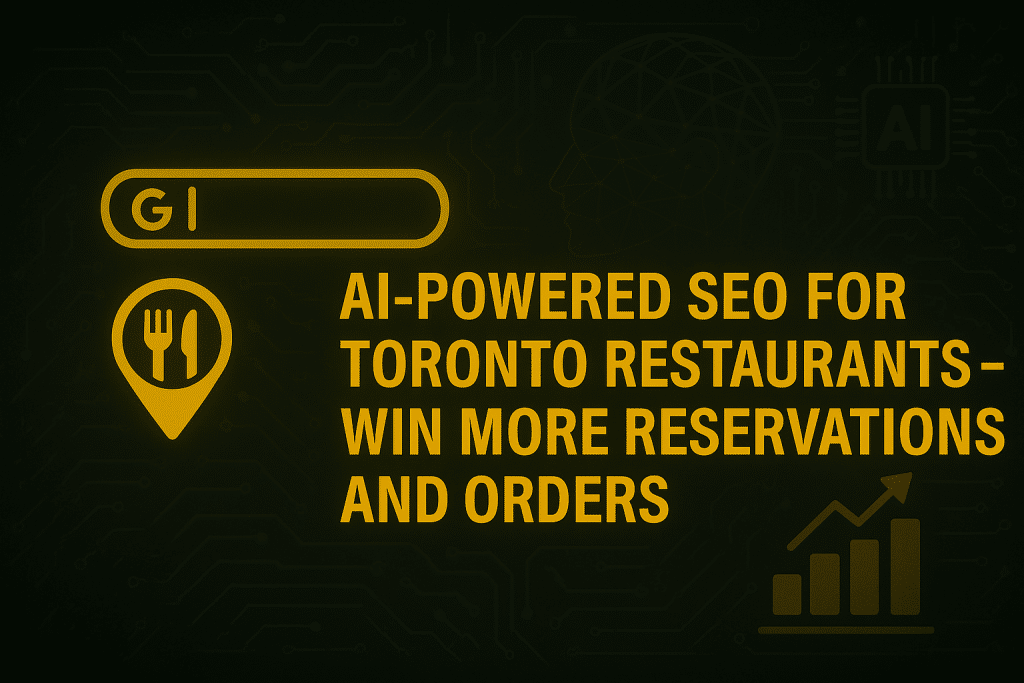Toronto’s restaurant scene is one of the most competitive in North America. With thousands of eateries—from fine dining to casual cafés—standing out on Google is no longer optional. Diners increasingly search online before choosing where to eat, and they expect instant, personalized results. AI-powered SEO is reshaping how Toronto restaurants capture visibility, attract local diners, and turn online searches into filled tables.
This guide explores exactly how restaurants can harness AI-driven search optimization to win more reservations and orders, outperform local competitors, and future-proof their marketing strategies.
Why Toronto Restaurants Need AI-Powered SEO
The Shift in Search Behavior
Customers are no longer typing simple queries like “restaurants near me”. Instead, they are asking Google AI-powered tools complex, conversational questions such as “What’s the best Italian restaurant in Toronto open late with gluten-free options?”.
AI systems prioritize context, intent, and relevance, meaning restaurants with optimized, structured content will appear higher in these AI-driven recommendations.
Rising Competition in Local SEO
Toronto has seen an explosion in local SEO adoption, as highlighted in Why More Toronto Businesses Are Turning to Local SEO in 2025. Restaurants that do not adapt risk being buried under competitors who are investing in AI-driven strategies.
Core Benefits of AI SEO for Restaurants
1. More Reservations Through Smarter Visibility
AI SEO ensures that when potential diners search for “best steakhouse near Yonge Street” or “family-friendly brunch Toronto”, your restaurant shows up with accurate details, high-quality content, and customer reviews.
2. Increased Online Orders
Third-party delivery apps are costly. AI SEO empowers restaurants to capture direct orders by ranking their own websites for high-intent keywords, reducing dependency on Uber Eats or DoorDash.
3. Stronger Customer Engagement
AI-driven personalization allows restaurants to tailor offers, menus, and promotions to what local diners are actively searching for, improving conversion rates.
Key AI-Powered SEO Tactics for Toronto Restaurants
Optimizing for Conversational Search
Google’s AI-driven search understands natural language. To capture this audience, restaurant websites should feature FAQ sections, blog posts, and menu descriptions written in conversational tones.
For example, a sushi bar could publish content answering:
“What is the best sushi restaurant in downtown Toronto?”
“Where can I find all-you-can-eat sushi with vegan options?”
Leveraging AI-Enhanced Local SEO
AI SEO tools analyze search trends, competitor strategies, and keyword opportunities in real-time. For Toronto restaurants, this means:
Building Google Business Profile pages optimized for AI searches.
Earning local visibility in Google Maps 3-Pack, as covered in Toronto Local SEO: Why Your Business Isn’t Showing Up on Google Maps.
Using schema markup to help AI engines understand menus, operating hours, and delivery options.
Content That Converts Diners
Generic restaurant websites no longer perform. AI SEO requires content optimization to match diner intent. This includes:
Location-focused landing pages (“Best Vegan Restaurant in Toronto’s Queen Street West”).
Blog articles tied to search trends, as noted in Content Optimization: Boosting Engagement and Rankings.
Seasonal campaigns (Valentine’s Day menus, Summer patio dining).
Harnessing Reviews and Social Proof
AI systems factor customer reviews heavily. Restaurants that encourage satisfied guests to leave reviews on Google and Yelp will consistently appear higher in AI-generated recommendations. AI tools can also analyze sentiment to identify menu strengths and areas to improve.

Integrating AI with Reservation Systems
By connecting AI SEO strategies with booking platforms (OpenTable, Resy, or in-house systems), Toronto restaurants can automate reservation funnels, ensuring customers who search online complete their booking in just a few clicks.
Case Example: How AI SEO Outranks Paid Ads
Many Toronto restaurants still invest heavily in Google Ads. But as highlighted in SEO vs Google Ads in Toronto, SEO provides sustainable, long-term visibility without skyrocketing costs. AI SEO ensures organic rankings that convert, while paid ads vanish once budgets run out.
External Validation and Authority
Even government-backed research emphasizes the importance of digital adoption for small businesses. The Government of Canada’s Digital Main Street initiative supports local businesses in digital transformation, proving SEO is no longer optional.
Additionally, industry studies from Statista confirm that more than 70% of diners rely on online searches before choosing a restaurant, further underlining the importance of SEO.
Advanced AI SEO Strategies Restaurants Should Adopt
Predictive Keyword Targeting
AI tools forecast which local food-related keywords are trending, allowing restaurants to publish content before competitors catch on.
AI-Powered Visual SEO
Google now analyzes images for search ranking. Optimizing food photography with proper alt text and AI tags ensures Toronto restaurants appear in image-driven searches like “best poutine Toronto photos.”
Voice Search Optimization
With smart devices growing in popularity, diners are asking Alexa, Siri, and Google Assistant where to eat. Optimizing for voice queries like “Where’s the nearest late-night pho in Toronto?” ensures your restaurant captures this traffic.
Data-Driven Menu Optimization
AI tools analyze which dishes are trending locally. Restaurants can align their menus with customer demand while simultaneously optimizing keywords for SEO.
The Competitive Edge for Toronto Restaurants
Restaurants that embrace AI-powered SEO will:
Dominate local rankings for high-intent searches.
Reduce reliance on costly third-party apps.
Build loyal, returning customers through tailored online engagement.
As noted in Top SEO Agencies in Toronto Are Using AI to Outrank the Competition, AI-driven SEO isn’t a trend—it’s the new standard for businesses serious about growth.
Conclusion: Future-Proofing Restaurant Success
Toronto’s dining industry is rapidly evolving, and customer discovery habits are driven by AI-powered search engines. Restaurants that prioritize AI SEO will not just survive but thrive—winning more reservations, increasing online orders, and securing long-term brand visibility.
Ready to transform your restaurant’s SEO strategy? Contact us today to start dominating Toronto’s restaurant search results.


